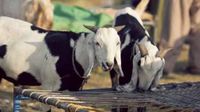The preparations for Eid-ul-Adha have kicked off in Pakistan, with the Rawalpindi administration setting up 12 designated animal markets to facilitate the sale of sacrificial animals. This initiative aims to streamline the process while ensuring public order and traffic management during the festive season.
As the holy festival approaches, the Rawalpindi administration has taken significant steps to regulate the sale of animals. The selling of sacrificial animals in residential neighborhoods, narrow streets, and major urban roads will be strictly prohibited. Authorities have warned that violators may face severe penalties, including fines, legal action, and even confiscation of livestock.
The management of these cattle markets will fall under the jurisdiction of the District Council, Rawalpindi Cantonment Board (RCB), and Chaklala Cantonment Board (CCB). Currently, the process of awarding contracts for market operations is underway, ensuring that everything is in place before the official market activities commence.
Each of the 12 markets will be equipped with essential facilities, including access to electricity, water for both traders and animals, and temporary shade. Usage fees will apply for these amenities, and temporary electrical meters are set to be installed. Water will be delivered to the markets via tankers to ensure that both animals and traders have adequate access to this vital resource.
Among the various locations designated for these markets, the largest will be established at Bhatta Chowk, strategically located near the Rawalpindi-Islamabad border under the supervision of RCB. This site is expected to attract a significant number of buyers and sellers due to its accessibility.
In addition to the primary markets, other locations managed by the District Council will include Rawat, Adiala Road, Chakri Road, Gujar Khan, Kallar Syedan, Kahuta, Kotli Sattian, Murree, and Taxila. Meanwhile, CCB will oversee two specific sites: one behind the Lahore High Court Rawalpindi Bench and the other next to Sangit Cinema near Mareer Chowk, maintaining a tradition of designated trading areas.
Preparations for the markets are expected to begin on May 15, 2025, with the arrival and early sale of animals anticipated from that date. However, official market operations will continue from May 28, 2025, until the second day of Eid-ul-Adha, allowing ample time for buyers to select their sacrificial animals.
As the market date approaches, there are growing concerns among the public regarding the rising costs of sacrificial animals. Reports indicate that prices have surged by 30 to 40 percent compared to the previous year. Traders attribute these increases to various factors, including higher utility costs, increased stall and land rental fees, expensive transportation, toll charges, and a rise in the cost of fodder and water within the markets.
Current market estimates suggest that bulls will be priced between Rs300,000 and Rs1.5 million, while goats and sheep may range from Rs130,000 to Rs300,000. With these price hikes, many families are feeling the financial strain as they prepare for the festivities.
In addition to the animal sales, there will be various commercial spaces available for rent, including stalls selling food, beverages, fodder, and accessories for animals. This will provide an opportunity for local businesses to thrive during the busy market days. Parking fees for both customer vehicles and loader vehicles have also been revised upward, contributing to the overall cost of participating in the Eid celebrations.
To maintain cleanliness and hygiene within the market areas, contractors will be responsible for regular sanitation and upkeep. This ensures that the environment remains safe and welcoming for all attendees, especially given the large crowds expected during the Eid festivities.
As the community gears up for Eid-ul-Adha, the Rawalpindi administration's efforts to organize the sacrificial animal markets reflect a commitment to facilitating a smooth and orderly experience for all involved. With the expected influx of buyers and the rise in animal prices, it will be crucial for both the administration and the community to work together to ensure a successful and joyous celebration.
In summary, the upcoming Eid-ul-Adha celebrations in Pakistan are shaping up to be significant, with the Rawalpindi administration implementing thorough preparations to accommodate the public's needs while addressing the challenges posed by rising animal prices. As the markets prepare to open, many are hopeful that the festive spirit will prevail despite the financial hurdles.




